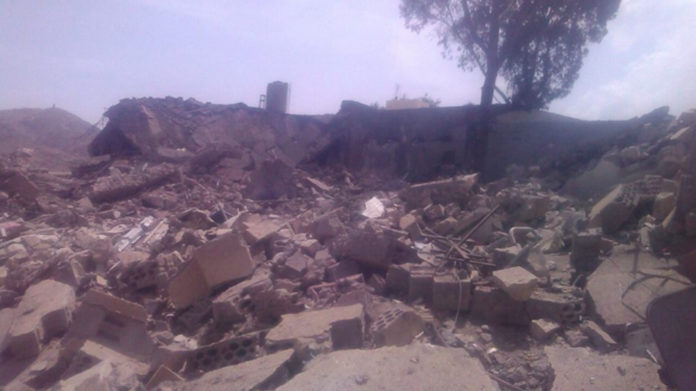Another Doctors Without Borders facility in Middle East hit by airstrike

A Doctors Without Borders facility in Yemen was heavily damaged by an airstrike from the Saudi-led coalition fighting Shiite rebels, also referred to as Houthis, in Yemen’s civil war. The attack comes three weeks after a Doctors Without Borders hospital in Kunduz, Afghanistan, was destroyed by a U.S. airstrike.
The facility, located in Yemen’s Saada governorate, was hit multiple times. Two staffers were reported to have suffered injuries caused by debris.
.@MSF first photos for its health facility in Haydan #Saada after the airstrikes that took place last night. #Yemen pic.twitter.com/PUFEF0Yiq5
— ????? ??? ????-????? (@msf_yemen) October 27, 2015
The first strike came around 11 p.m. on Monday, Hassan Boucenine, the organization’s director in Yemen, told Reuters. The first hit damaged the operations theater while it was empty, fortunately, and the staff were busy with people in the emergency room. They just had time to run off as another missile hit the maternity ward, Boucenine added.
“It could be a mistake, but the fact of the matter is it’s a war crime,” he said. “There’s no reason to target a hospital. We provided (the coalition) with all of our GPS coordinates about two weeks ago.”
“The staff just had time to run off as another missile hit the maternity ward” #Saada #Yemen https://t.co/XawpQGCCTq pic.twitter.com/ux8pBICS5F
— MSF International (@MSF) October 27, 2015
“It’s completely destroyed,” Boucenine said.
Doctors Without Borders operates in eight Yemeni governorates at a time when many foreign aid groups and even United Nations personnel have been evacuated. A second facility in the Saada governorate is still open and operational, according to the agency.
.@MSF teams in #Saada are still providing life-saving health services in the Jumhori Hospital. #Yemen #YemenCrisis pic.twitter.com/g9Q7U5y20F
— ????? ??? ????-????? (@msf_yemen) October 27, 2015
Saada, the Houthis stronghold, has faced a particularly intense bombardment from the coalition, which has been firing airstrikes against rebels since March.
MSF recently faced challenges when Houthi forces prevented their trucks carrying essential medical supplies from entering the central city of Taiz, Yemen’s third largest city which has been hit hard by rebel shelling.
View from the roof of .@MSF hospital in #Saada, #Yemen that was hit by multiple airstrikes last night. pic.twitter.com/a7Hpf14VJM
— MSF UK Press Office (@MSF_Press) October 27, 2015
.@MSF medical supplies were blocked from entering a besieged area in #Taiz governorate. #Yemen #YemenCrisis pic.twitter.com/KsAkGMHs0F
— ????? ??? ????-????? (@msf_yemen) October 25, 2015
Yemen has been embroiled in fighting between the Houthis and allied army units against forces loyal to the internationally recognized government as well as southern separatists and other militants.
The conflict gained international attention when the Houthis took over the capital, Sanaa, in September last year, and escalated in March when the coalition started launching airstrikes against Houthi positions.
In Geneva, the office for the U.N. high commissioner for human rights said Tuesday that some 2,615 civilians have been killed in Yemen violence over the last six months. OHCHR spokesman Rupert Colville said about two-thirds of those deaths were caused by air strikes, and the rest by Houthi rebels and their allies.
Additional reporting by The Associated Press
